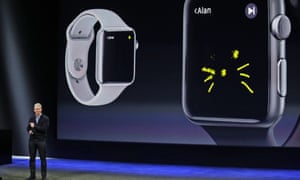To Wall Street, Apple is a company where the glass is constantly half-full. Itsquarterly results on Tuesday night showed revenues up 33% and operating profits up 37% to $49bn (£31bn) and $14.1bn respectively.
However, there were disappointments for investors grown used to quarter after quarter of stellar figures. Unit sales of iPhones rose 35% to 47.5m in the three months ending June, about four times more than the broader smartphone market, but analysts had expected 50m or better.
Revenues in China more than doubled; but the stock market there has been volatile recently, raising questions about the company’s ability to keep growing in a country that generates more than a quarter of sales. And forward guidance for the current quarter, of sequentially flatrevenues, was given a lacklustre reception.
Then there was the Apple Watch: while Tim Cook, the chief executive, gave no numbers, to avoid giving competitors useful data, analysts poring over the results reckon it generated about $1bn, or perhaps 2.5m units sold. That would make Apple the largest and most valuable seller of wearables in the world from a standing start in a single quarter – but shouldn’t it have sold more, at higher prices?
The company is also expanding, perhaps Napoleonically, on multiple fronts. It has launched Apple Music, an ambitious paid-for streaming service that aims to win over customers from services such as Spotify; introduced the contactlessApple Pay payments system to the UK before Google’s Android Pay scheme; and is expected to try to breathe new life into the fading iPad line, which has seen six successive quarters of year-on-year shrinking sales, with a larger model in the autumn.
So what’s the truth about Apple? Is it washed up or tearing ahead?
For industry analysts, the best way to view it is in comparison to rivals. As Cook was warming up, Microsoft was also announcing its own results, which contained its own version of Napoleon’s retreat from Moscow in the form of a $7.5bn writeoff of its 2013 acquisition of Nokia’s mobile handset business.

It spent only $7.3bn there, but seen no benefit as its Windows Phone business obstinately refuses to grow (it sold 8.4m phones in the past quarter) and increasingly loses money. Its other efforts in hardware, with the Surface tablet line, haven’t taken off either: despite revenues of $888m (and unknown, if any, profits). The iPad, with 10.9m units and $4.5bn in revenues in the latest quarter, still outsells it easily.
Instead Microsoft’s chief executive, Satya Nadella, is taking the company back to its knitting, focussing on software and services by making its most lucrative apps, such as Office, available on every software platform, including Apple’s iPhoneand Google’s Android.
It is also about to launch Windows 10 by providing it free to any of the world’s 1.5bn PC users, rather than charging for it as in the past 30-odd years. And this is taking place against the backdrop of a PC market where sales are dwindling by about 10% annually. But the market seems satisfied with that, pushing Microsoft’s stock near to its five-year high.
Similarly Google, where a new cost-cutting regime has improved the bottom line,delighted the markets last week. Analyst consensus is for 22% year-on-year growth in this quarter. Noticeably, that figure is near identical to Apple’s. Yet one company is seen as taking off, and the other as mired.
Carl Howe, formerly of the analyst business Yankee Group, remarked on Twitterthat Apple is now heading for $200bn revenues in its current fiscal year: “Wall Street seems to have no clue that 21% year-over-year growth for a $200bn company is unprecedented.”
But as ever with Wall Street, it’s the promise of growth, not its realisation, that gets it excited. That feeling was summed up by Colin Gills, of BGC Partners, who told Reuters of his foreboding at Apple’s growing success married to its reliance on China: “Where are you going to find growth in the world?” he said. “You’ve done an amazing job sucking all the smartphone profits into your balance sheet, but smartphone sales are slowing. What’s going to happen when the industry matures, just like PCs did?”
To that, there’s no immediate answer from Cook and Apple. There is only the implied promise of an expanding user base to whom to sell new or replacement phones, watches and music services.
Speaking to analysts in the earnings call , Cook was firm: “I think everybody’s going to own a smartphone, and I think we’ve proven that we can compete for a fair number of those … We think the phone has a lot of legs to it. I mean, many, many, many years. There’s tons of innovation left at the phone. I think we’re in the early innings of it, not in the late innings, and I think the market rate of growth over the long haul will also be impressive.”
Horace Dediu, a former Nokia executive who now works at the Clayton Christensen Institute at Harvard Business School, likes to say that Apple is like an object in orbit: the maths suggests it is constantly falling, yet it never hits the earth. For Cook, considering another drubbing by the analysts, that might have to do.
[“source – theguardian.”]

